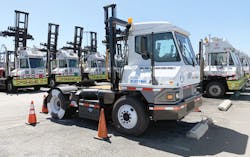Toyota and partners take another step forward in next-gen propulsion technology
Toyota North America has created the first hydrogen fuel cell electric utility tractor rig with Fenix Marine Services for the pollution-plagued Port of Los Angeles.
The UTR prototype, known as “UNO,” made its first moves around the Fenix container terminal in October, but the formal announcement was made in November at the Fuel Cell Seminar and Energy Exposition in Long Beach, CA.
The UNO is powered by the same modular fuel cell foundation as Toyota’s zero-emission Mirai electric passenger cars and Project Portal electric semi-truck prototypes. The hydrogen fuel provides quicker refueling time than battery-electric options. The first UNO test cycle at Fenix ran for 2.5 hours per trial on the rail and consumed one fill of its two hydrogen tanks. Additional tanks can be added for the desired range and can be filled in about 3 minutes, allowing much quicker options to get back on the road than battery.
The UNO was imagined and developed by Toyota engineers and deployed at the Fenix terminal as a test of how zero-emission container handling equipment could operate in a real-world, marine terminal environment.
Toyota has also been working with the Kenworth Truck Co. to develop 10 electric-hydrogen fuel cell heavy-duty trucks to move freight from the Port of Los Angeles to nearby cities, helping to reduce air pollution problems in the region. All 10 are expected to be in operation before the end of 2020.
The first of these electric-hydrogen Kenworth T680 trucks, which combine hydrogen gas and air to produce electricity, was delivered to UPS earlier this year. The electricity powers electric motors to move the trucks while also charging the lithium-ion batteries to optimize performance as needed.
The UNO is another move by Toyota to find environmentally efficient solutions for the freight industry.
“We view the hydrogen fuel cell electric UTR ‘UNO’ as an expansion of our Project Portal hydrogen fuel cell electric Class 8 heavy-duty truck development,” said Andrew Lund, chief engineer of Toyota Motor North America Research and Development. “We appreciate the support of the Port of LA and Fenix Marine Services to allow us to demonstrate another application of Toyota’s hydrogen fuel cell electric technology.”
Fenix’s terminal at Pier 300 in the Port of Los Angeles handles more than one million containers per year, and deployment of the UNO could help to meet its ongoing commitment to the Port’s Clean Air Action Plan goals.
“The UNO deployment demonstrates how cutting-edge environmental technology and maritime operations are not mutually exclusive,” said Gene Seroka, executive director of the Port of Los Angeles. “We applaud Fenix for constantly looking at how to move containers in the most economical and environmentally efficient way.”
“We appreciate the partnership with Toyota,” said Scott Schoenfeld, general manager of Fenix’s terminal development group. “This deployment is hopefully the first of many zero- and near-zero emission platforms throughout the facility.”
In the next few months, Fenix will look at testing a “Hydrogen Electric Hybrid Top Pick” to assist with cargo movement through the terminal, the company said.
The San Pedro Bay Clean Air Action Plan (“CAAP”), passed in 2008 and updated most recently in 2018, focuses on the increased use of near-zero and zero-emission CHE (“Container Handling Equipment”) by 2030 in order to meet, and exceed, statewide air emission goals.
BYD, Toyota create joint battery-electric R&D
On the other side of the Pacific Ocean, Toyota has inked a new deal with BYD Company (BYD) to establish a joint company to research and develop battery-electric vehicles (BEVs).
The new R&D company, which will work on designing and developing BEVs (including platform) and its related parts, is expected to be established in China in 2020, with BYD and Toyota to evenly share 50% of the total capital needed. Additionally, BYD and Toyota plan to staff the new company by transferring engineers and the jobs currently involved in related R&D from their respective companies.
“We aim to combine BYD’s strengths in development and competitiveness in the battery-electric vehicle market with Toyota’s quality and safety technology to provide the best BEV products for the market demand and consumer affection as early as we can,” said Lian Yu-bo, senior VP of BYD.
“With the same goal to further promote the widespread use of electrified vehicles, we appreciate that BYD and Toyota can become ‘teammates,’ able to put aside our rivalry and collaborate,” Toyota executive VP Shigeki Terashi said. “We hope to further advance and expand both BYD and Toyota from the efforts of the new company with BYD.”
About the Author
Josh Fisher
Editor-in-Chief
Editor-in-Chief Josh Fisher has been with FleetOwner since 2017. He covers everything from modern fleet management to operational efficiency, artificial intelligence, autonomous trucking, alternative fuels and powertrains, regulations, and emerging transportation technology. Based in Maryland, he writes the Lane Shift Ahead column about the changing North American transportation landscape.

